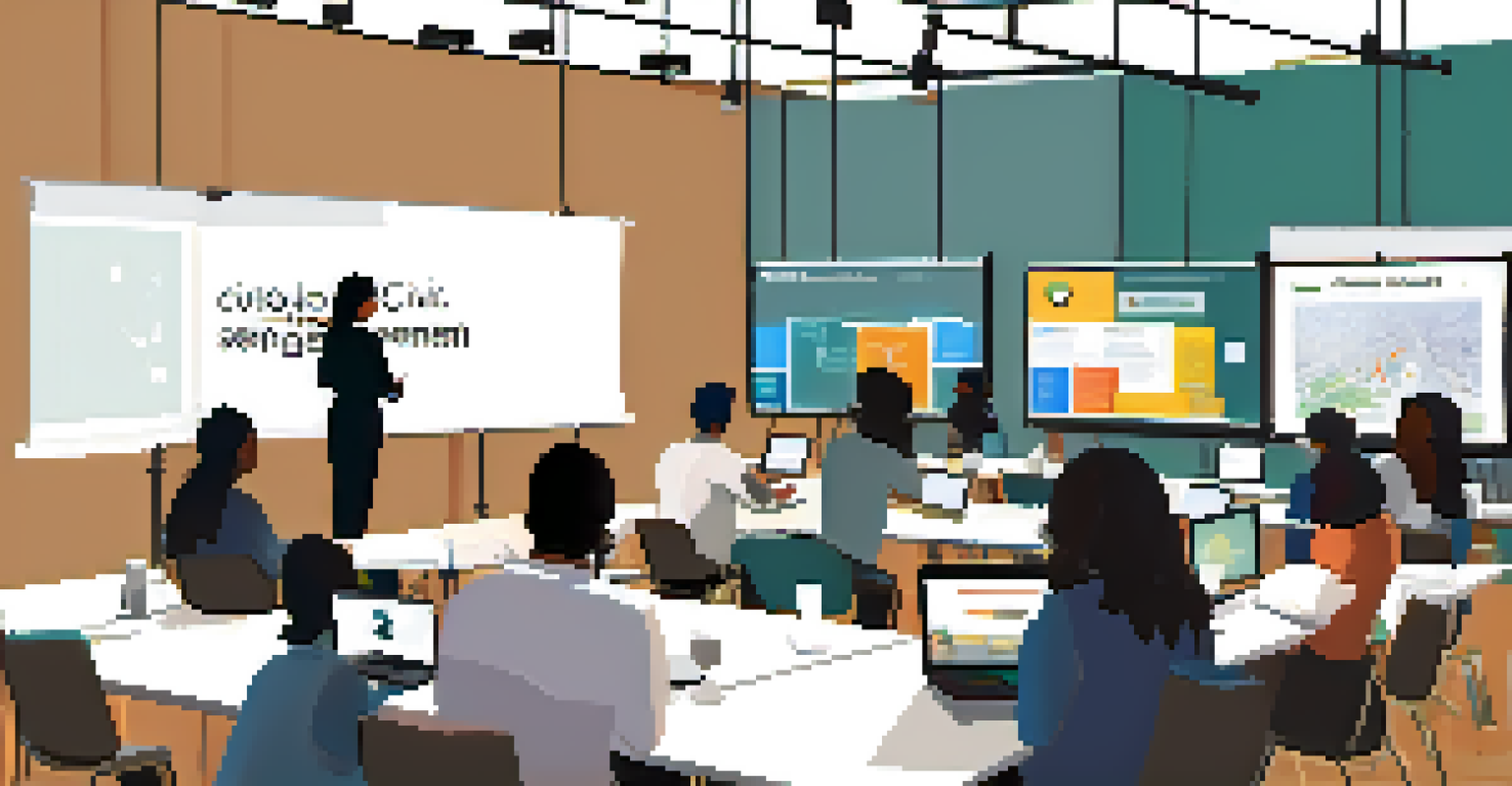Civic Engagement: Involving Austin Residents in Local Governance

Understanding Civic Engagement in Austin
Civic engagement refers to the ways individuals participate in their community and influence local governance. In Austin, this can take many forms, from attending city council meetings to volunteering for local initiatives. The goal is to create a vibrant community where residents have a voice in the decisions that affect their lives.
The best way to find yourself is to lose yourself in the service of others.
When residents engage with their local government, it fosters a sense of belonging and responsibility. This involvement not only enhances the democratic process but also builds trust between citizens and their leaders. For instance, when people feel their opinions matter, they are more likely to participate in future civic activities.
Moreover, civic engagement can lead to more informed policies that reflect the community's needs. It encourages a two-way dialogue between government officials and residents, ensuring that all voices are heard. Ultimately, this collaboration can significantly improve the quality of life in Austin.
Benefits of Civic Engagement for Residents
Participating in local governance offers numerous benefits for residents. First and foremost, it provides a platform to express concerns and ideas, ensuring that community priorities are addressed. This can lead to improved local services, infrastructure, and overall quality of life.

Additionally, civic engagement helps build strong networks among residents. By coming together for common causes, individuals foster connections that can lead to lasting friendships and collaborations. These relationships can enhance community resilience and create a supportive environment for everyone.
Civic Engagement Boosts Community Voice
Active participation in local governance empowers residents to express their concerns and influence decisions that affect their lives.
Lastly, being actively involved in civic matters empowers residents. It instills a sense of agency and control over one’s environment, making individuals feel more invested in their community. This empowerment is crucial for cultivating a vibrant and active citizenry.
How to Get Involved in Local Governance
Getting involved in local governance in Austin can be as simple as attending community meetings or joining local organizations. Residents can start by researching upcoming events through the city’s website or local community boards. This allows individuals to stay informed about issues that matter to them.
Civic engagement is about making a difference in your community, and the best way to do that is to get involved.
Another effective way to engage is by volunteering for city committees or advisory boards. These platforms give residents a chance to contribute their expertise and perspectives directly to decision-making processes. Plus, it’s a fantastic way to meet like-minded individuals who share similar interests.
Lastly, residents can advocate for causes they are passionate about by contacting their local representatives. Writing letters, making phone calls, or even organizing grassroots campaigns can amplify their voices. Engaging with officials not only brings attention to important issues but also encourages others to participate.
Digital Tools for Civic Engagement
In today's digital age, technology plays a crucial role in enhancing civic engagement. Online platforms allow residents to participate in discussions, share ideas, and access information about local governance from the comfort of their homes. Websites like Nextdoor and Facebook groups can serve as virtual town halls where community members connect.
Moreover, many local governments, including Austin, have embraced technology to streamline communication with residents. Tools such as online surveys and mobile apps allow citizens to provide feedback on various initiatives easily. This accessibility can significantly boost participation rates, especially among younger demographics.
Digital Tools Enhance Participation
Technology facilitates civic engagement by providing platforms for residents to connect and share their ideas conveniently.
Additionally, social media can be a powerful tool for advocacy and awareness. Residents can share information about local issues and mobilize support for initiatives. By leveraging these digital platforms, Austin residents can enhance their civic engagement and influence local governance even further.
Challenges to Civic Engagement in Austin
While civic engagement is crucial, there are challenges that can impede participation in Austin. One significant barrier is the lack of awareness about local governance processes. Many residents may not know how decisions are made or how to voice their opinions effectively, leading to disengagement.
Another challenge is time constraints. With busy schedules and competing responsibilities, many individuals may struggle to find time to engage in civic activities. This can create a perception that civic engagement is only for those with spare time, which is simply not true.
Lastly, socio-economic factors can also play a role in civic participation. Residents from marginalized communities may face additional barriers, such as language differences or lack of access to transportation. Addressing these challenges is essential for fostering a more inclusive and engaged citizenry.
Success Stories of Civic Engagement in Austin
Austin has witnessed numerous success stories of civic engagement that highlight the power of community involvement. For example, local initiatives like the Austin Neighborhoods Council have empowered residents to have a say in neighborhood planning and development. This has led to more community-driven solutions that reflect the needs of residents.
Another noteworthy example is the city's participatory budgeting process, which allows residents to directly influence how a portion of the budget is spent. This initiative has encouraged diverse community members to come together and prioritize projects that matter most to them. As a result, there are more equitable allocations of resources across the city.
Challenges Hinder Civic Involvement
Barriers such as lack of awareness, time constraints, and socio-economic factors can impede community participation in Austin.
These success stories serve as inspiration for other residents to get involved. They demonstrate that when individuals come together and engage with local governance, they can effect real change in their communities. This collective action not only strengthens neighborhoods but also reinforces the importance of civic engagement.
The Future of Civic Engagement in Austin
As Austin continues to grow, the future of civic engagement looks promising. With an increasing number of residents seeking to participate in local governance, there are ample opportunities for collaboration and innovation. This growing interest can lead to more dynamic and responsive governance that truly reflects the community's values.
Moreover, the integration of technology into civic engagement will likely continue to evolve. As more residents become comfortable with digital tools, we can expect innovative platforms that facilitate greater participation. This shift can help bridge gaps and engage a broader audience in local decision-making processes.

Ultimately, the future of civic engagement in Austin depends on the willingness of both residents and local leaders to prioritize collaboration. By fostering an inclusive environment where all voices are valued, Austin can continue to thrive as a vibrant and engaged community. The possibilities are endless when residents take an active role in shaping their future.